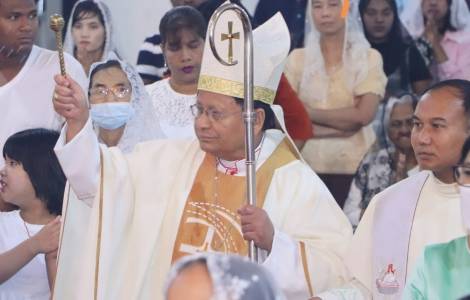
Yangon (Agenzia Fides) - "The earthquake has increased the tears and wounds of our people. Thousands of people have no food. Thousands have no drinking water. Fear has forced them to sleep in the streets, exposed to the scorching sun during the day and relentless heat at night. The people are in a state of physical and psychological prostration," Cardinal Charles Maung Bo, President of the Bishops' Conference of Myanmar and Archbishop of Yangon, told Fides, as people in the Southeast Asian country continue to suffer the consequences of the terrible earthquake that struck the center and north of the country on March 28.
"There is an urgent need for food, water, shelter, and medicine for the thousands of injured," he reported. And there are also moral and spiritual needs: "People who are suffering need the warmth of others who share their pain and tears and care for them. We are in a traumatized and wounded nation that does not want to give in to despair and is trying to react," the Cardinal said.
"The central part of Myanmar," Cardinal Bo continued, "is completely devastated. Nearly 20% of our population is on the streets, still frightened and traumatized by what geologists call the largest earthquake of the century. More than 3,000 people have already lost their lives, and the death toll continues to rise. Many more are trapped under the rubble, and bodies continue to be recovered. It is terrible; the tears flow incessantly."
The Burmese Catholic community has approximately 700,000 members in a country with a total population of 51 million and a Buddhist majority. Catholics, along with the rest of the population, mourn the hundreds of families affected, while churches, institutes, seminaries, and pastoral structures have collapsed or been damaged: "Many churches and religious buildings have been destroyed, especially in the Diocese of Mandalay," Cardinal Bo notes. "Many buildings have already been devastated by the war and must be demolished and rebuilt. But the greatest challenge, even more than the construction of new brick buildings, is to rebuild the Christian community with the 'living stones' of the People of God. This will require a long journey and patient work, with the help of the Holy Spirit, who creates the Church." In this situation, Cardinal Bo acknowledges the work of "priests, religious, and catechists who have borne the burden of various forms of violence over the past four years": "Many of them," Cardinal Bo continued, "have been displaced. We have four displaced bishops (in the dioceses of Banmaw, Loikaw, Pekhon, and Lashio) who had to leave their cathedrals or episcopal sees because of the conflict. We are a Church in exodus, facing enormous challenges with courage and trust in God. I am happy to say that the priests, the consecrated men and women, and the pastoral workers are faithful companions of our people in a time of great trials. They are dedicated to serving their neighbors and are dispensers of mercy and hope." Myanmar's main hope today is for an end to the bloody violence: "We were the first to call for a ceasefire, which is now all the more urgent to facilitate humanitarian aid," the Cardinal recalled. "So far, this call has gone unheeded. Now is the time to silence the guns, provide food and medical supplies, and treat the injured. I would like to recall that the country embarked on the path to democracy after Cyclone Nargis in 2008. And this time, too, the earthquake will pave the way, showing everyone that peace is our common destiny, that it is the only path we must pursue with all our hearts and with all our strength, in the interest of all." In this effort, the people feel the support of Pope Francis: "After his visit to Myanmar in 2017," said the Archbishop of Yangon, "Pope Francis seems to have fallen in love with our people. He has always followed the crisis in Myanmar and prayed for our country on several occasions. In a very touching gesture, after his recent illness, his first thought was of Myanmar, conveying his best wishes and prayers, which is a balm of consolation for us." (PA) (Agenzia Fides, 4/4/2025)